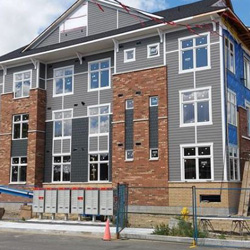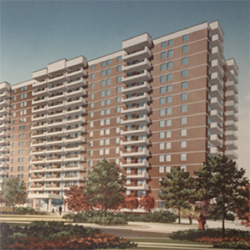Existing Buildings
For guidance on how co-operative housing is formed and managed read the Guide to Co-operative Housing. Housing co-operatives are democratic organizations that are member-owned and controlled. Decisions are made by a majority vote of the board of directors or members, depending on the issue. Before taking any action, read co-op by-laws.
Do the groundwork before going before the general co-op membership. It will be important to build support for the issue–make sure you are well prepared in advance of attending any board of directors’ meetings, owners’ meetings or an annual general meeting. Be prepared to address member concerns and opposition. Due diligence is important and building support over time may result in the best outcome.
It is important to convey that a no-smoking policy is not about targeting or passing judgment on smokers, but about protecting non-smokers from the known health hazards of exposure to second-hand smoke.
To create a policy that works for your building, consider who the policy will apply to, where it will apply, what will be regulated, when it will come into effect and how it will be enforced. A smoke-free policy in a condominium’s declaration can include many forms, so it is important to clearly specify which areas will be designated as non-smoking.
No-smoking options include:
- All units
- All units including balconies and patios
- Within a certain distance such as 9 metres from doorways, operable windows and air intakes
- On outdoor common areas such as patios, swimming pools, gardens
- On the entire property, up to the property line
A designated outdoor smoking area could be provided if the size of the property allows it. Ideally, such an area would have a roof, somewhere to sit, somewhere to dispose of cigarette butts safely, and would be located well away from outdoor common areas like pathways and patios. Keep in mind the nature and layout of the complex and ensure the policy protects the health of residents. Ensure that the shelter meets specifications under the Smoke-Free Ontario Act.
Regardless of the scope of the policy chosen, it must comply with relevant legislation, including the Co-operative Corporations Act and the Ontario Human Rights Code.
Consider who the policy will apply to. No-smoking policies should apply to members, visitors, invited guests, service providers and contractors. Usually members are responsible for advising guests and visitors about where they can and cannot smoke.
Think about what substances you want to include in your policy and provide a clear definition. The Smoke-Free Ontario Act prohibits smoking of tobacco and cannabis and vaping of any substances in common areas of multi-unit housing. You may want to consider the same substances.
Decide on a start date for the policy. Six months to a year should be enough time to gather required information and prepare for the policy. Spring and summer are ideal times to launch a new policy–that gives people enough time to get used to stepping outside for a cigarette before the snow flies!
New Co-ops
If you are going to incorporate a housing co-operative and want to make the building 100% smoke-free from the outset, including a no-smoking policy in the articles of incorporation is the simplest way forward. The articles could specifically state that its object is to provide smoke-free accommodation and that the restrictions on the business that it may carry on are that it cannot allow smoking inside individual units or on its property. The first directors of a housing co-op could also pass a no-smoking bylaw to establish it as a smoke-free environment from the outset. A no-smoking policy can avoid problems, costs and fire risk of maintaining a building where smoking is permitted.
“Green” construction is on the rise with more buildings becoming LEED (Leadership in Energy and Environmental Design) certified. A 100% smoke-free environment is perhaps the easiest and least expensive way that a developer can improve the quality of indoor air in a building.
A no-smoking policy can include many differences, so it is important to clearly specify which areas will be designated as non-smoking. Ideally, survey results will help to guide the scope of the policy. Examples include:
- In private units only;
- In private units including private use balconies or patios;
- Within a certain distance (e.g. 9 m) from doorways, operable windows and air intakes;
- Outdoor common areas such as patios, swimming pools, gardens, etc.;
- On the entire condominium property, up to the property line.
You also have the choice to provide a designated outdoor smoking area if the size of the property allows it. Ideally, such an area would have a roof, somewhere to sit, somewhere to dispose of cigarette butts safely, and would be situated well away from outdoor common areas like pathways, patios, etc. In choosing the appropriate policy for the complex, it is important to keep in mind the nature and layout of the complex, and ensure the policy is connected to protecting the health of residents.
Regardless of the scope of the policy chosen, it must comply with relevant legislation, including the Co-operative Corporations and the Ontario Human Rights Code.
“Grandparenting” provisions
In Ontario there is no legal requirement for a housing co-operative to “grandparent” (exempt) current unit owners who are not supportive of a no-smoking policy. A grandparent provision could be for a specified length of time (i.e. smoking will continue to be permitted for 6 months or one year) or for the duration of the ownership of the unit until the unit is sold.
If there are no members in the building who smoke, it may be easy to create a policy where there is a complete ban on smoking without a grandparent clause. On the other hand, there may be members in the building who are in favour of a no-smoking policy only if it includes a grandparent provision. It could be difficult to pass a no-smoking policy if it is strict and offers no adjustment time for people who smoke. At the same time, a policy that grandparents members will not offer relief to other members who are suffering from involuntary second-hand smoke exposure.






